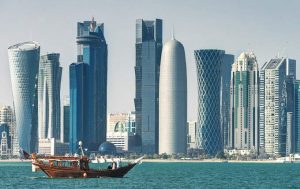

DOHA – Qatar’s economy will continue to expand steadily this year, according to the latest Middle East Economic report for the Q1-2021 from Oxford Economics and commissioned by ICAEW.
According to the report, Qatar’s non-oil sector, which grew by an average of 1.2% per annum in 2017 to 2019 and contracted by an estimated 3.9% in 2020, is expected to grow by 3.3% in 2021.
An increase in vaccination rates and the expansion of vaccination centres distributing both the Pfizer and Moderna vaccines will facilitate the lifting of restrictions by the second half of 2021 and lead to a re-acceleration in economic growth. So far, about 15% of the Qatari population have received at least one vaccine dose, according to Qatar’s Ministry of Public Health.
Overall, the report forecasts GDP growth of 2.8% this year, after an estimated 3.1% fall in 2020. It also states that growth will continue to expand steadily because of ongoing investment ahead of World Cup 2022 and rising gas production.
The impact of the decline in non-oil GDP on jobs has been relatively modest. Qatar stands out for its dependence on the contribution of expats, who account for over 90% of the population. However, while the expat population declined by around 4.5% between March 2020 and January 2021, it is expected to gradually return as the economy recovers from the pandemic.
Although trade performance remains disappointing, vaccination progress globally will support external demand as the need for social distancing restrictions fades and borders re-open. This combined with the recent increase in natural gas prices should also support a recovery in export and budget receipts in the coming months.
Qatar has based its 2021 budget on a conservative assumption of a $40 per barrel (pb) oil price, slightly above the fiscal break-even point recently estimated by the IMF (about $38pb in 2021, the lowest in the GCC). This will lead to another year of deficit, with low oil and gas prices continuing to take a toll and government spending rising. However, spending restraint (particularly project spending) limited the deterioration in public finances in 2020, which will likely cap the budget deficit to around 4% of GDP.


Scott Livermore (pictured right), ICAEW Economic Advisor and Chief Economist at Oxford Economics,
“The political disjoint in the GCC has also weighed on foreign investment in the region, with Foreign Direct Investment actually being pulled out of Qatar over the past couple of years. More harmony in the GCC would boost the region’s attractiveness to foreign investors as the global economy recovers. While the upside potential would be greatest for Qatar, the benefits could accrue in the rest of the region too.”
The mending of relations between Qatar, the rest of the GCC and Egypt is unlikely to provide an immediate boost to growth, but the Economic Update report predicts that it will act as a foundation for post-Covid-19 recovery, particularly when borders re-open and travel resumes.
RIYADH, June 2 – Ellora Group, a leading Doha-based distributor of building materials and industrial fasteners,…
DUBAI – President Donald Trump’s recently concluded visit to the Gulf Cooperation Council (GCC) countries has…
DUBAI – Dubai’s music scene is set to sizzle this June with a lineup of international…
DUBAI – The United Arab Emirates is set to host a vibrant array of events this…
ABU DHABI– Etihad Airways, the national airline of the United Arab Emirates, has entered into…
RIO DE JANEIRO – Carlo Ancelotti has officially arrived in Brazil to commence his role as…